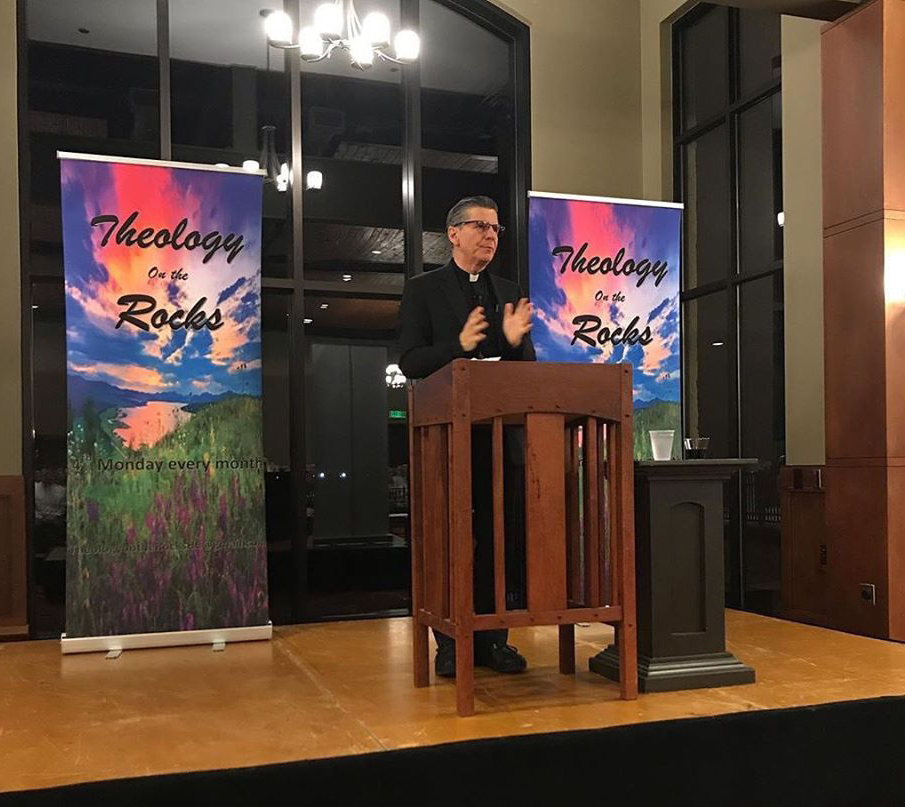A presentation on preparing for Lent had about 230 people gathering in the parish hall at St. Peter the Apostle Church in Boerne as Archbishop Gustavo García-Siller, MSpS, spoke at Theology on the Rocks-Hill Country for the second time on February 17, the week prior to Ash Wednesday.
“Yes, it is that time when McDonald’s starts selling a fish sandwich, and sales of peanut butter go up!” Archbishop Gustavo joked as he began, then followed on a more serious note. “But Lent is not a time when we don’t eat meat on Friday, it is a time of preparation for the glory of Easter. We follow our Lord into the desert and take on spiritual disciplines to remove distractions from our hearts and souls. Then we can follow the Lord into his Paschal Mystery.”
The archbishop asked attendees to take a look at the disciplines in a way that will make all more ready to start this blessed time. Christians intensify three religious practices during Lent: fasting, prayer, and almsgiving. These have been inherited from our Jewish roots and Catholics share such practices even today with the Jewish community.
Fasting can mean different things. Catholics fast on Ash Wednesday and Good Friday, abstaining from meat and eating only one full meal (and two smaller meals according to one’s need to maintain strength). Catholics also abstain from meat on all the Fridays of Lent.
“Fasting is a way to discipline our body and make us more aware of our dependence on God, getting in touch with the deepest spiritual hunger in our lives. It is a way of becoming more attentive to how we live our lives,” Archbishop Gustavo explained. “We find what is truly needed and what is simply extra. Fasting’s purpose is to draw us closer to God.”
It is also traditional to “fast” from other things during Lent. Often it is giving up candy or other sweets. “If we observe this kind of ‘fast’ every day during Lent, we may be tempted to break our commitment occasionally, to sneak just one little piece of candy or a cookie. But there is also something very satisfying when we find that we can discipline ourselves and persevere in our ‘fasting’ throughout the 40 days,” the archbishop recognized. “This is a helpful discipline, but it is rightfully a very juvenile way of fasting. We adults have come farther than that, so our fasting should grow as we have.”
The Missionary of the Holy Spirit offered his own suggestion for Lent this year: May we “fast” from being angry and reactionary people during this Lent. “We have become so outraged as a society. Everything is a cause to lose peace and shout about what is ‘not right,” he pointed out. “May our Lenten fast be to ‘give up’ that worldly way of reacting. We are Christians, and we can choose to respond with patience, peace, and understanding, with care for our sister or brother in Christ.”
The San Antonio prelate then elaborated on prayer; giving time and space to be with God. During Lent there are traditions of praying the rosary daily, and Stations of the Cross take place regularly in parishes. Archbishop Gustavo emphasized that these are beautiful traditions and they need to be kept, however, he once again he urged reflection on an adult faith. “How can we truly deepen in prayer during this season?” he asked.
The archbishop stressed that one thing needed in this noisy world is to cultivate a sense of silence, and that Christians need to reclaim the tradition of contemplation.
“Contemplation means we sit in silence with the Lord, and let the Holy Spirit speak to our hearts in ways we cannot hear with our ears or understand with our minds,” he added f. “It can be difficult, as our brain rushes to fill the silence. But use this Lenten time to practice.”
Archbishop Gustavo offered this formula: Give 5 or 10 minutes a day to start. Find a place you can be a peace, then sit comfortably and ask God to be with you. Silence your mind and heart. Let God move in his mysterious ways. When thoughts or images come flashing in — and they will! — simply acknowledge them and let them slip past you. You can deal with them later. This is a privileged time with God. Let prayer be your foundation.
Lastly, the archbishop discussed almsgiving, one of the most misunderstood aspects of Lenten practices. Examples of almsgiving include things such as a second collection for the poor or Operation Rice Bowl. Archbishop Gustavo acknowledged the importance of these efforts, but candidly said that these things are often reduced to giving the change we have in our pocket at the time. He emphasized that real almsgiving is intentionally caring for the poor, seeing those in need as sisters and brothers, and being urgent about sharing with them.
“How can you or even your family serve the poor this Lent? Can you make sandwiches and hand them out to the homeless?” he questioned. The archbishop offered as responses to volunteer at Catholic Charities, organize a canned food drive for 40 Cans for Lent, or give up something you are used to and spend that money helping those who do not have the resources you have.
“Almsgiving reminds us that we are all united in the world,” he summed up. “Everyone on earth is my neighbor, all are my brothers and sisters, and we need to work to open our hearts to them.”
Archbishop Gustavo wrapped up his remarks by urging listeners to approach Lent like adults, allowing God to deepen faith and faithfulness by deepening these practices so many grew up with. “May they be tools to increase our love of God and our love of neighbor, so that when Holy Week comes, we will be ready to welcome the Lord of love and life,” he concluded.


